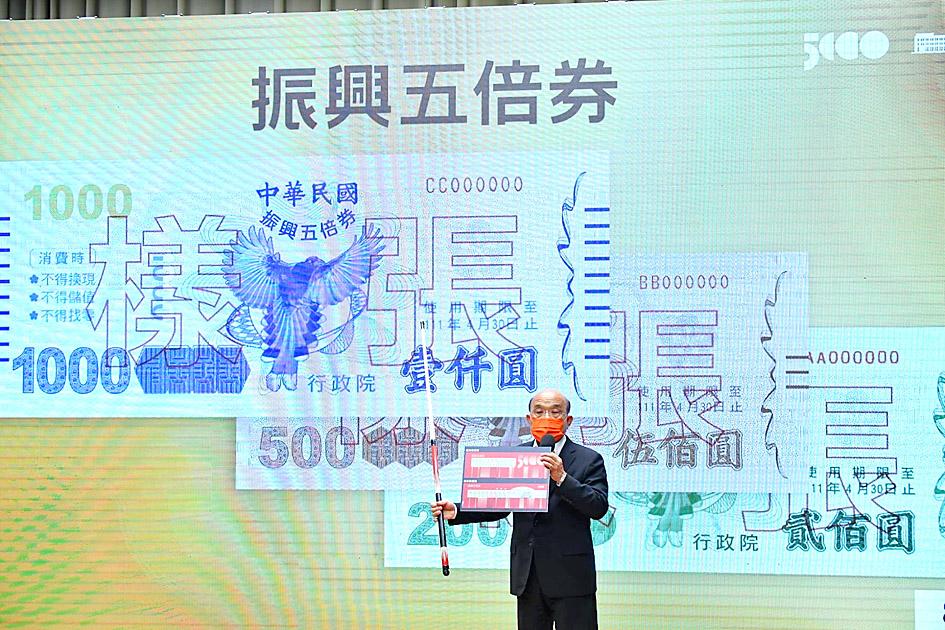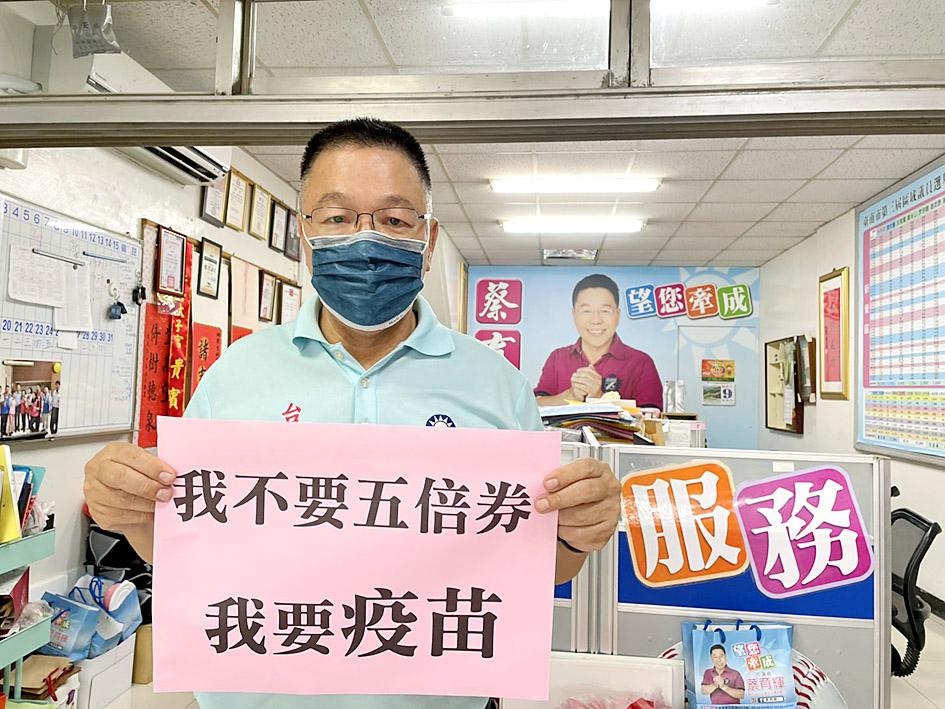The Quintuple Stimulus Voucher program has been finalized and Oct. 8 set as the issuance date, while an economic benefit of up to NT$200 billion (US$7.21 billion) is expected, the Executive Yuan said yesterday.
Premier Su Tseng-chang (蘇貞昌) disclosed the program details at a news conference in Taipei.
The vouchers would be offered in print or electronic versions to Taiwanese; their foreign, including Chinese, spouses; holders of Alien Permanent Resident Certificates; and diplomats, Su said.

Photo: Lee Hsin-fang, Taipei Times
People can register for digital vouchers from Sept. 22 via 5000.gov.tw or other digital payment platforms, while registration for print vouchers is available at convenience stores from Sept. 25 and at post offices from Oct. 4, Su said.
The vouchers could be used as payment at restaurants, street markets, department stores, hotels, cram schools, concerts, sports events, tourism-related businesses and Taiwanese online retailers, as well as public schools for miscellaneous fees, he said.
Online retailers and deliverers were not excluded because they agreed to work with the government in helping local businesses and small farmers, he said.

Photo: Wang Shu-hsiu, Taipei Times
In exchange for being allowed to participate, online businesses would reduce transaction and advertisement fees charged to small businesses and farmers, Su said.
Platform compliance would be monitored by the Ministry of Economic Affairs, while Minister Without Portfolio Audrey Tang (唐鳳) would help them design the technologies needed to implement their part, he said.
Barcodes and QR codes facilitating the vouchers’ use at brick-and-mortar stores and online venues would be issued to voucher recipients, he said.
The vouchers could not be used for transactions connected with stock trades, investment products, taxes, credit card fees, fines, foreign-based online retailers, tobacco products or buying other types of vouchers, Su said.
The vouchers are designed to function as a currency with a use-by date, he said.
The voucher program — which is being reviewed by the Legislative Yuan — is expected to add NT$200 billion to the economy, although the actual results could vary due to the COVID-19 situation and other factors, National Development Council Minister Kung Ming-hsin (龔明鑫) said.
The vouchers would come in several denominations and each recipient would have a set worth NT$5,000, Minister of Economic Affairs Wang Mei-hua (王美花) said.
Store owners might give change for the vouchers, but would not be required to do so, she said.
Separately, central bank Governor Yang Chin-long (楊金龍) said that the vouchers would be printed using nearly the same technologies that keep nation’s currency from being counterfeited, making them difficult to fake.
The central bank would soon air public service announcements showing store owners and clerks how to spot fake vouchers, he said.
On Aug. 19, an Executive Yuan official said on condition of anonymity that holders of an Alien Permanent Resident Certificate or a diplomatic identification card would likely be eligible for the voucher program.
The 13,000 foreigners who were eligible for the Triple Stimulus Voucher program would also be eligible for the Quintuple Stimulus Vouchers, the official added.
Additional reporting by CNA and Yang Chun-hui

MAKING WAVES: China’s maritime militia could become a nontraditional threat in war, clogging up shipping lanes to prevent US or Japanese intervention, a report said About 1,900 Chinese ships flying flags of convenience and fishing vessels that participated in China’s military exercises around Taiwan last month and in January have been listed for monitoring, Coast Guard Administration (CGA) Deputy Director-General Hsieh Ching-chin (謝慶欽) said yesterday. Following amendments to the Commercial Port Act (商港法) and the Law of Ships (船舶法) last month, the CGA can designate possible berthing areas or deny ports of call for vessels suspected of loitering around areas where undersea cables can be accessed, Oceans Affairs Council Minister Kuan Bi-ling (管碧玲) said. The list of suspected ships, originally 300, had risen to about 1,900 as

Right-wing political scientist Laura Fernandez on Sunday won Costa Rica’s presidential election by a landslide, after promising to crack down on rising violence linked to the cocaine trade. Fernandez’s nearest rival, economist Alvaro Ramos, conceded defeat as results showed the ruling party far exceeding the threshold of 40 percent needed to avoid a runoff. With 94 percent of polling stations counted, the political heir of outgoing Costa Rican President Rodrigo Chaves had captured 48.3 percent of the vote compared with Ramos’ 33.4 percent, the Supreme Electoral Tribunal said. As soon as the first results were announced, members of Fernandez’s Sovereign People’s Party

MORE RESPONSIBILITY: Draftees would be expected to fight alongside professional soldiers, likely requiring the transformation of some training brigades into combat units The armed forces are to start incorporating new conscripts into combined arms brigades this year to enhance combat readiness, the Executive Yuan’s latest policy report said. The new policy would affect Taiwanese men entering the military for their compulsory service, which was extended to one year under reforms by then-president Tsai Ing-wen (蔡英文) in 2022. The conscripts would be trained to operate machine guns, uncrewed aerial vehicles, anti-tank guided missile launchers and Stinger air defense systems, the report said, adding that the basic training would be lengthened to eight weeks. After basic training, conscripts would be sorted into infantry battalions that would take

GROWING AMBITIONS: The scale and tempo of the operations show that the Strait has become the core theater for China to expand its security interests, the report said Chinese military aircraft incursions around Taiwan have surged nearly 15-fold over the past five years, according to a report released yesterday by the Democratic Progressive Party’s (DPP) Department of China Affairs. Sorties in the Taiwan Strait were previously irregular, totaling 380 in 2020, but have since evolved into routine operations, the report showed. “This demonstrates that the Taiwan Strait has become both the starting point and testing ground for Beijing’s expansionist ambitions,” it said. Driven by military expansionism, China is systematically pursuing actions aimed at altering the regional “status quo,” the department said, adding that Taiwan represents the most critical link in China’s